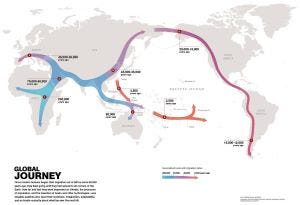
Discover more from Life in the 21st Century
(Im)migration
I'm a rabbit from East Germany
I was sort of happy
I became an immigrant and went to North Britain
I was sort of happy
I could frolic around all night in the green grass
I was sort of happy
Hop Hop Hop
Hop Hop Hop – The Fall*
Aristotle wrote homo sapiens were by nature political animals. We are also migratory animals. From our origins on the African savannas, humanity spread across the planet. Today, with 8 billion people, migration numbers are greater than ever. Due to economic, political, and environmental factors, migration will vastly expand in coming decades.
Sometime around a quarter-million years ago, Homo sapiens evolved in East Africa. Seventy to sixty-thousand years ago, people left Africa crossing over to the Middle East. Over the next ten-thousand or so years, humans migrated across southern Asia, reaching Australia fifty-thousand years ago. We spread up across Asia and back into Europe around the same time we reached Australia. Then fifteen-thousand or so years ago, some small populations crossed to the Americas.
All these early migrations, including the initial move out of Africa, were relatively small populations, eventually becoming established and growing in each area. From genetic studies, it seems there was only one early migration out of Africa from which we are descended. All humanity across the globe is genetically the same. The tiny differences that exist are greater among the several groups who remained in Africa than all those outside. The human family is not just a metaphor, it is scientific fact.
Migration continued across human history. Early civilizations from the Ancient Egyptians to Han Chinese saw migration with military excursions. The Romans spread from central Italy across the Mediterranean and then, over hundreds of years, saw peoples from the rest of Europe and Central Asia march through the gates of Rome. After Rome's fall, various other groups of Europe moved across the continent. In the Middle East, the Arabs swept east across Asia and west across North Africa to Spain. For two thousand years, the Bantu people of West Africa moved across central and south Africa. And maybe history's greatest sweeping migration saw the Mongols in half a century move across much of Asia and Eastern Europe.
Six centuries ago, Europe sailed across the Atlantic to the Americas, over time becoming one of the greatest number of immigrants in history, including a great number of Africans in shackles. Before Europeans and Africans got to the Americas, its earlier immigrants were always on the move. Aztec history has them immigrating from northern Mexico to the south, while the famously fierce Apaches of the 19th century US Southwest had moved down from the northern plains several centuries before. This general sweeping view of the history of human migration does not include the innumerable smaller groups or just families who across millennia picked up and moved. Migration is literally in our blood.
In the 19th century, as arbitrary notions of the nation state and nationalism became dominant, migration took on new connotations. The US is known as a nation of immigrants. Yet, each group that arrived never openly welcomed the next. As America and Europe industrialized, colonizing the globe for resources, economic advantage became a main driver of migration. Today, the US and OECD countries, including most of Europe and Japan, account for over half of all global economic activity, but have only 18% of the total global population. It is estimated almost a trillion dollars a year is sent by migrants back to the lands where they originated.
An excellent report by an United Nations agency shows almost 300 million people migrated in 2019, that's 3.5% of the global population. In 25 years, global immigration increased by 100 million people. Many moved from war zones, including Syria, Congo, and Afghanistan.
As economic disparities rise and environmental degradation increases, including soil erosion and water depletion, migration will continue to rise. It will also be an increasingly divisive issue, an issue only understood in a global context. Despite all our cultural differences, we are very much one species, one human family, all requiring very basic shared wants and needs, such as water, food, shelter, and as Aristotle long ago deduced, social connection. We are also a migratory species, and if these things can't be found where we are, we will search for them – Hop Hop Hop.
*For a band filled with irony, none greater than one of its great line-ups was three Americans and a Greek wife on keyboards - God Love Mark E. Smith
Subscribe to Life in the 21st Century
History, Science, Energy, Technology, Environment, and Civilization




